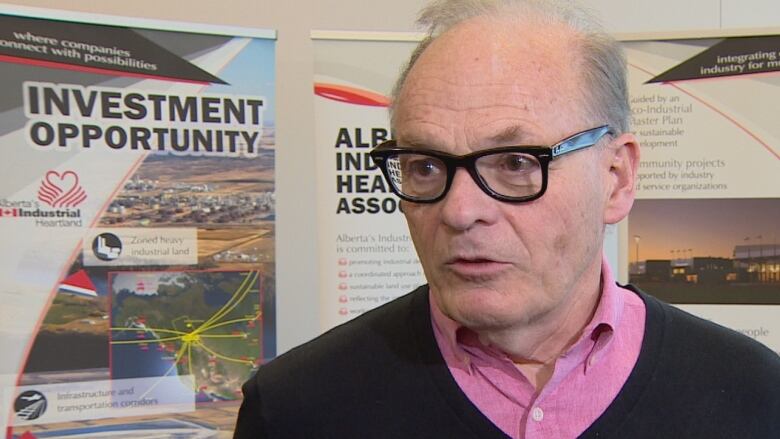Alberta Industrial Heartland worried about Trump's tough trade talk
'It's going to be really ugly' if U.S. imposes major trade restrictions and taxes, says refinery builder

There's concern in Alberta's Industrial Heartland about the possibility of a Donald Trump-led U.S. government imposing a new border tax and renegotiating NAFTA.
"It's going to be really ugly if they do that,"Ian MacGregor, chair and president of North West Refining Inc., said Thursday at the Heartland association's annual stakeholder luncheon at Northlands Expo Centre.
MacGregor's company is a50-per-cent owner in the North West Redwater Partnership, which is building the Sturgeon Refinery 45 kilometres northeast of Edmonton. The first new refinery built in Canada since 1984, it will convert bitumen into ultra low-sulphur diesel and other products when it starts operating late this year.
One way for the oil and gas industry to get around what could be coming with a Trump administration would be for Canada to take its own protectionist measures and build more refineries here, MacGregorsaid.
Added taxes and a change in trade rules may create "the urgency that we need" to refine more in Alberta, he said.
"Alberta is a tremendously entrepreneurial place. If you create urgency here, we respond," he said. "When things get bad, we get going."
It would also be to Canada's economic advantage to export more refined products, MacGregor said.
"I can put about 3 times the value in the existing pipeline network if I send diesel rather than us sending diluted bitumen."
A higher value product also makes it worthwhile for the industry to ship by rail, which tends to cost more than transportation in a pipeline, he added.
Changes not imminent
Any regulatory changes will affect the oil and gas industry, said Michelle Dawson, director of regulatory and public affairs at Calgary-based Inter Pipeline, a major petroleum transportation, storage and natural gas liquids processing business.
But Dawson is not in fear of an imminent threat, instead saying she's taking a "wait and see" approach.
She believes any changes to the North American Free Trade Agreement would take quite some time, giving the industry an opportunity to figure out its response.
The oil and gas market is very integrated and it would difficult to determine "whose is whose" since "ours isn't wearing little Canadian flags," she said.
Next phases of refinery ahead
After the Sturgeon Refinery's $8.5-billion first phaseis completed, MacGregor would like to move onto the second phase. But he would need more government help.
Most of the bitumen going into the refinery's first phasewill be supplied by the Alberta government, which will pay billions in fees over the next 30 years for it to be processed.
MacGregor cited ConferenceBoard of Canada numbers, saying that if three phases get built, the refinery would generate $385 millionin taxes per year.
"That all goes to school teachers, and nurses, and universities and all the things we need around here," he added.
He would rather see Alberta get those tax benefits rather than than see Canadian bitumen refined in the U.S,
He will be going to the Alberta government "soon" to seek approval for phase two, saying the provincial economy needs it.
"I think we've got to be really worried about the economy here," MacGregor said.
"We had 7,000 [construction]people out there before Christmas, we've got about 5,500 now because we're finishing up. I want to get 7,000 people back."












_(720p).jpg)


 OFFICIAL HD MUSIC VIDEO.jpg)
.jpg)



























































































